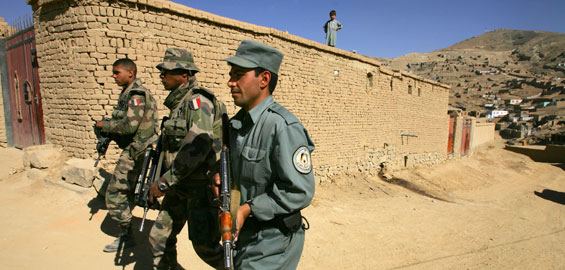What is France’s Nato role?
As Nato turns 60, Al Jazeera examines France’s decision to rejoin central command.

 |
| France has the fourth largest deployment of troops in Afghanistan [File: Gallo/Getty] |
The North Atlantic Treaty Organisation (Nato) will mark its 60th anniversary during its two-day summit in Strasbourg, beginning on Friday, April 3.
Al Jazeera’s Hamish Macdonald explains why France is set to rejoin Nato’s central command after a 43-year absence.
There have been divisions among Nato’s key players ever since the inception of the alliance, but those tensions have been accentuated in recent years by differing views on how to fight the war in Afghanistan.
There is a divided command structure in the battle against the Taliban and al-Qaeda, which means that Nato’s International Security Assistance Force (Isaf) fights alongside the US-led coalition forces.
Friction
Crucially, these two separate forces have different rules of engagement, which has been the source of great friction in recent years.
At present, Isaf is commanded by a US general even though, technically, Nato central command has oversight.
France has the fourth largest deployment of troops in Afghanistan and clearly wants more of a say.
|
Nato is becoming “a two-tiered alliance of those who are willing to fight and those who are not” Robert Gates, |
Sarkozy recently said: “We commit the lives of our soldiers, but do not participate in the committee that defines strategy and operations.”
Sarkozy’s argument is that “the time has come to put an end to this situation”.
There is no consensus within French politics about whether Sarkozy’s plan is a good one.
However, France’s move to rejoin Nato’s central command could go some way to delivering a more cohesive leadership within the alliance.
“The Nato summit must signal that allies can define a common purpose for the transatlantic partnership as they go forward to develop a new strategic concept,” James M Goldgeier, from the Council on Foreign Relations, says.
His comments follow those made by Robert Gates, the US defence secretary, at the Munich security conference in February, where he described Nato as becoming a “two-tiered alliance of those who are willing to fight and those who are not”.
De Gaulle withdrawal
France withdrew from Nato’s Central Command in 1966 when Charles de Gaulle, the then-president, felt it was necessary to guard his country’s sovereignty, in particular its nuclear assets.
 |
| Sarkozy: ‘We commit the lives of our soldiers but do not … define strategy’ [AFP] |
It was, as the Financial Times‘ Ben Hill described it, “a defiant assertion of independence from US hegemony … the de Gaulle decision was cherished as a guarantee of sovereignty and an element of national pride. It was a point of national consensus”.
Sarkozy now wants France to play a bigger role in the alliance and, thereby, international affairs, but it will come at the cost of what France’s former Socialist foreign minister described as the “touchstone of France’s defence and foreign policy”.
According to one French military source, who spoke anonymously to Al Jazeera before the summit, this “changes nothing”. Sarkozy’s move is more a symbolic one, designed to formalise arrangements which already exist.
The return of France to central command will mean that it receives two command posts, one in Norfolk, Virginia, and the other in Portugal. It is also likely to join the remaining two of the 36 Nato committees of which it is not already a sitting member.
As a result, it will play a formal role in the construction of Nato’s strategic doctrine.
Playing a role in the strategic direction of the alliance is where Sarkozy must be hoping France can play a bigger role in global affairs, particularly in shaping the rapidly shifting future of military efforts in Afghanistan.